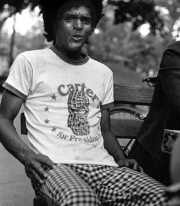By Kristin Edwards
For many, the T-shirt is more than an article of clothing — it is a traveling billboard. People express their thoughts and ideas on subjects ranging from sports to religion through the messages on their T-shirts.
Judy Seigel, a resident of Morton St. in the West Village, tells the history of political T-shirts in her self-published book “[Read My T-shirt] for President . . . a True History of the Political Front and Back.”
The book gives a retrospective of political T-shirts and their significance in society, as well as a series of photographs of people in T-shirts displaying political messages. The shirts pictured in the book range from witty to profound to obscene.
The photos were taken in New York City, nearly all in the streets below 14th.
“I live here. As we often like to say, ‘We get a nosebleed above 14th St.,’” Seigel explained of her geographic area of concentration.
Before developing her passion for photographing the T-shirt, Seigel was a painter.
She fell into T-shirt photography by accident back in the ’70s. She explained that she was on the subway one day, when she saw a girl seated across from her wearing a T-shirt which read, “Zionist Hooligan.” The shirt caught her attention: “I thought, ‘This is street literature, someone should document this,’” she recalled.
At the time, Seigel didn’t think it would be her who would undertake this task. “Not me, I’m a happy a painter,” she thought.
One day, a film crew was shooting in her neighborhood, a scene in which a car kept driving by with a white fluffy dog in it. On the stoop in front of her house, a man sat wearing a T-shirt that read: “A Trained Dog Is a Happy Dog.” The urge to document again overcame her.
Seigel ran upstairs and got her camera, and soon started her series of T-shirt photos. She brought a series of photos to a book editor, who loved the idea, though after it made it to the to the top of the chain of command, the book was rejected. The sales manager feared that the “T-shirt trend” would be over by the time the book came out, Seigel said.
Despite the rejection, Seigel continued taking photos and became a self-described “process junkie.” She enrolled in photography classes, and even taught some classes. Yet her interest in T-shirts remained.
In August 2004, Seigel attended the Manhattan march protesting the Republican National Convention. Seigel recalls a comment by a Washington Post writer who called the march “the most boring protest I’d ever seen.” But Seigel had been in her element, reveling in the colorful, creative and passionate T-shirts and signage.
Seigel said people were surprised by the Democratic victory in 2006, but they shouldn’t have been. If they had paid attention to the T-shirts, it would have been apparent that people were discontent with Republican rule, she said.
In fact, many of the T-shirts in the book reflect liberal viewpoints despite Seigel’s attempt to capture photographs of shirts reflecting opposing views. In an effort to achieve balance, she ventured beyond the sacred boundary of 14th St. to the Upper East Side and even went to a gun show. While she was able to find some people wearing T-shirts opposing certain issues, such as pro-life T-shirts, or “Republicans for Kerry,” Republican T-shirts were hard to find.
“Maybe Republicans don’t wear T-shirts,” she joked.
Still trying to find a publisher for the book, she was told that while the book was great, it wasn’t what they were looking for. So she published it herself.
Initially, the book was going to be a history of message T-shirts from the past 25 years, expanding on the photos from her initial project in 1978. However, as her collection of photographs of political T-shirts began to grow, she changed her mind.
“The political T-shirts would overpower the other types of T-shirts,” Seigel said. She felt the messages on these shirts were too important to be put into a book alongside a T-shirt with a message like — she thought of some bad example — “I’m a Drunk. Alcoholics Go to Meetings.”
As Seigel looks ahead to the future, she doesn’t know what she’ll do next. She might publish the photos of nonpolitical T-shirts or a series of essays. Seigel explained that she was in her 40s when she started taking photos of political T-shirts, showing how much people can change over time.
“I don’t know what I’ll do yet,” she explained. “I don’t plan it, it plans me.”
For more information about the book and how to get a copy, visit www.frontandbackpress.com.
thevillager.com







































